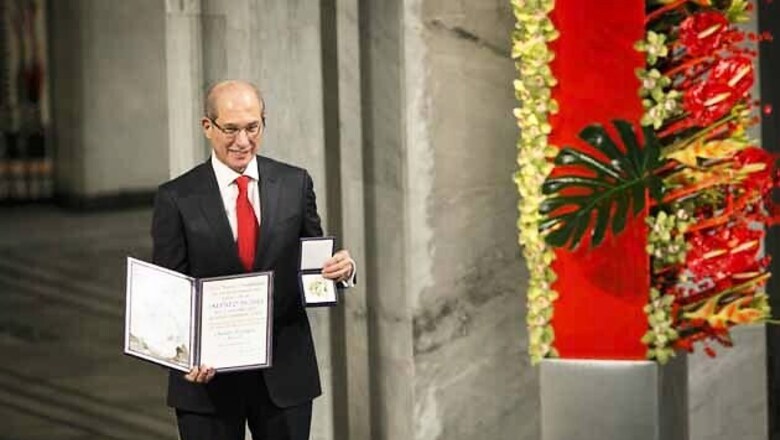
views
Recalling the "burning, blinding and suffocating" horrors of chemical weapons, the head of a watchdog trying to consign them to history accepted the Nobel Peace Prize on Tuesday.
Ahmet Uzumcu, director-general of the Organization for the Prohibition of Chemical Weapons, said such toxic tools of warfare have an "especially nefarious legacy," from the trenches of World War I to the poison gas attacks in Syria this year.
"You cannot see them. You cannot smell them. And they offer no warning for the unsuspecting," Uzumcu said as he collected the $1.2 million award in Oslo on behalf of the group.
The OPCW was formed to enforce a 1997 international convention outlawing chemical weapons. It worked largely out of the limelight until this year, when it received its most challenging mission to date: overseeing the destruction of Syria's chemical weapons stockpile.
The Nobel Peace Prize was announced on October 11, just days before Syria officially joined the OPCW as its 190th member state.
"It is of course a huge challenge for the OPCW to manage to destroy all these weapons under the conditions of war and chaos prevailing in the country," Nobel committee chairman Thorbjorn Jagland said. "The anonymous inspectors from the OPCW do an extremely important and difficult job."
Both Jagland and Uzumcu paid tribute to the late Nelson Mandela, who shared the Nobel Peace Prize with FW de Klerk in 1993.
Jagland called on the US and Russia to speed up the elimination of their own stockpiles and urged the six countries that have not signed or ratified the chemical weapons convention - Angola, North Korea, Egypt, South Sudan, Israel and Myanmar - to do so.
The Nobel awards in medicine, physics, chemistry and literature were set to be presented in Stockholm later on Tuesday.
The award ceremonies are always held on December 10, the anniversary of prize founder Alfred Nobel's death in 1896.



















Comments
0 comment